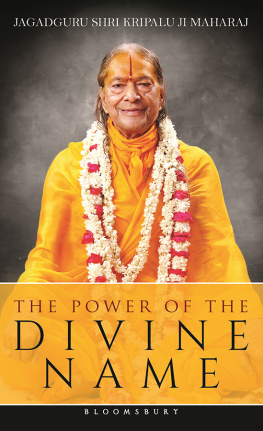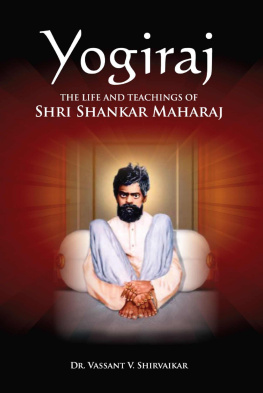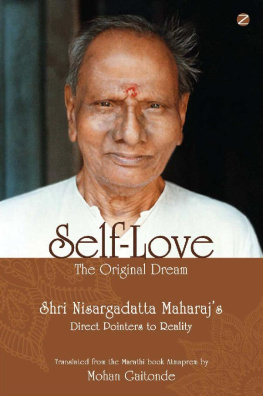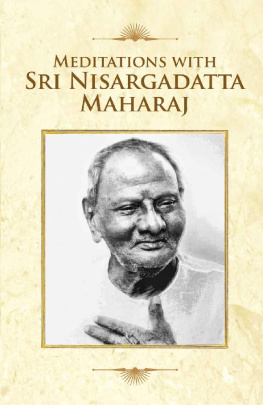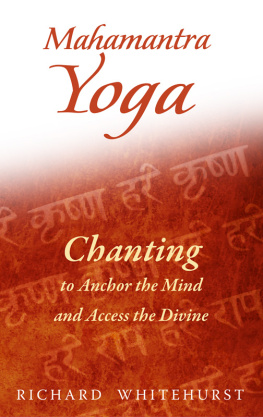
THE POWER OF THE
DIVINE NAME
THE POWER
OF THE
DIVINE
NAME
Excerpts from discourses by
Jagadguru Shri Kripalu Ji Maharaj
Translated by
H.H. Dr Shyama Tripathi
H.H. Dr Krishna Tripathi

BLOOMSBURY INDIA
Bloomsbury Publishing India Pvt. Ltd
Second Floor, LSC Building No. 4, DDA Complex, Pocket C 6 & 7
Vasant Kunj, New Delhi 110070
BLOOMSBURY, BLOOMSBURY INDIA and the Diana logo are trademarks of Bloomsbury Publishing Plc
JKP Logo is the trademark of Jagadguru Kripalu Parishat - Bhakti Dham
First published in India 2022
This edition published 2022
Copyright Dr. Shyama Tripathi, 2022
Jagadguru Shri Kripalu Ji Maharaj has asserted his right under the Indian Copyright Act to be identified as the Author of this work
All rights reserved. No part of this publication may be reproduced or transmitted in any form or by any means, electronic or mechanical, including photocopying, recording or any information storage or retrieval system, without the prior permission in writing from the publishers
This book is solely the responsibility of the author and the publisher has had no role in the creation of the content and does not have responsibility for anything defamatory or libellous or objectionable
Bloomsbury Publishing Plc does not have any control over, or responsibility for, any third-party websites referred to or in this book. All internet addresses given in this book were correct at the time of going to press. The author and publisher regret any inconvenience caused if addresses have changed or sites have ceased to exist, but can accept no responsibility for any such changes
ISBN: PB: 978-93-54352-52-2; eBook: 978-93-54356-46-9
Created by Manipal Technologies Limited
To find out more about our authors and books, visit www.bloomsbury.com and sign up for our newsletters
CONTENTS
All scriptures unanimously declare that sankirtana, congregational chanting of Gods names, is the only means to realise God in this age. However, many fraudsters, in the garb of holy men, are misleading the public into adopting hollow rituals instead, and teach concocted paths to follow for the attainment of God. In an environment where people are surrounded by so much confusion and deception, Bhakti-yoga-rasavatar (Descension of Divine Love and Bliss) Jagadguru Shri Kripalu Ji Maharaj propagated the true science of sankirtana along with rupadhyana (loving remembrance of God). He distributed to thirsty souls the nectar of Gods name and practically showed how it can be relished, while incessantly showering the exuberance of divine love and bliss over all.
Being unaware of the philosophy behind chanting the names of God, sankirtana today has become a mechanical drill; a mindless utterance of the words without deriving any true benefit. Collating excerpts from different discourses given on this important subject by Shri Maharaj Ji, The Power of the Divine Name explains how we can realise God through just chanting His name. Shri Maharaj Ji simply explains what we must properly understand about sankirtana and shows us how to deepen our faith in the glories that are imbued in the holy name of God.
Some devotional couplets pertinent to the text have also been selected from Radha Govind Geet and Shyama Shyam Geet, both principal compositions of Jagadguru Shri Kripalu Ji Maharaj.
Radha Govind Samiti
T he glory of Gods name is indescribable. There is no other way in this Kaliyuga to attain your goal.
(Skanda Purana)
This has been emphasised in the Skanda Purana three times in the same verse, Gods name is the only means to realise God. There is no other way; no other way, no other way!
(Ramayana)
In Satyayuga, sattvaguna (the mode of goodness) was predominant in people and therefore meditation on God was the means to attain ones goal. In the yuga (age) of Treta, people performed yajnas (Vedic rituals) as an offering to God. In the yuga of Dvapara, people performed elaborate deity worship and in this current Kaliyuga, sankirtana (congregational chanting of Gods names, attributes, pastimes, etc.) is the only means to attain ones goal.
The Ramayana declares the same, There is no other process in Kaliyuga. Neither yoga, japa (repetitive chanting), austerity, abstinence, yajnas or worship will take you to your goal. Just sing the glories of the Lord, engage your mind in practising rupadhyana (the practice of absorbing the mind in loving remembrance on a self-created form of God) and listen to His glories from the saints. This is the only means in Kaliyuga to attain ones goal.
This citation from the Ramayana is a translation of a verse from the Bhagavatam.
:
(Bhagavatam 12.3.52)
Whatever is attained through meditation in Satyayuga, through sacrificial rites in Tretayuga and ritualistic worship in Dvaparayuga will be obtained through sankirtana, chanting Gods name and singing the glories of His names, forms, qualities, abodes and associates.
Thus, in Kaliyuga, Gods name is the only means to realise Him.
(Ramayana)
There will be no dharma or righteousness in Kaliyuga. How can this be? Everything is in a mess. Dharma prescribes a course of conduct according to which a Brahmin, a Kshatriya, a Vaishya and a Shudra must perform their duties as prescribed in the Vedas. But now everything is topsy-turvy, and it has been for thousands of years. The Vedas say that one should earn money through honest means; one-tenth of it should be given away in charity and with the rest, one should perform sacrificial rites and oblations. Priests employed for this purpose must have complete knowledge of our scriptures. It must be ensured that there is no mistake in the pronunciation of any vowel of any word in any mantra (a sacred verse or text, especially from the Vedas). Strict rules and procedures have been laid down for performing such sacrificial rites. What happens these days is that the yajman (the one who performs the sacrifice by employing a priest) is dozing off and the priest keeps asking him to say swaha swaha where even a minor mistake in the pronunciation of a vowel results in the intended sense being reversed. What would happen when the chanting of every single hymn is out of sync is anybodys guess. If this is the situation with the priests nowadays, you can only imagine the fate of those who perform sacrificial rites in this manner.
The Vedas say, , It harms the yajman, not the priest. The priest is also punished, but the yajman will not be spared.
The poor yajman who is performing the yajna and spending his hard-earned money on it is doomed to go to hell because he is not performing it correctly. Lets say, a servant is making tea for his master. This is okay, as it is his job as a servant to do so. But this does not mean that while serving tea, he can spill some on his master. For doing so, he would be reprimanded. Initially, the master may only verbally scold him, but should it be repeated a second time, his master may well show him the door without paying his wages. Similarly, the Vedas have prescribed some rules regarding the worship of celestial gods, and if they are observed fully, only then will the act be in accordance with dharma.
In the process of ritualistic deity worship or devotion, some mantras, methods and procedures for worshipping have been prescribed. You must have seen in temples a set sequence being followed. Do this first, then that, then this. Bathe the deities, dress them, apply the sandal paste, light the incense and the lamp in front of them, present the offerings of edibles to them, etc. Each of these acts must be followed by the chanting of the appropriate mantra
Next page
